- Getting around Lijiang. Dont stay in the Old Towns more than 2 days, there is nothing to do. KRISS Oct 9, 2013 05:46
- 2013 Beijing Temple Fair BENNYLAU Feb 26, 2013 03:29
- Malaysian traveling from KUL - LAX vis Shanghai PVG ZATI_DY Jan 3, 2013 20:15
A River Flows from Heaven
- Views: 4260
- |Vote: 0 0
- |Add to Favorites
- |Recommend to Friends
Tanke is a dry, dusty, dirty service town for the surrounding grasslands. A police car sits in the middle of the intersection overseeing the small amount of traffic that floods the town during holidays and we ask them for advice about transport out of town. We are only going a few more kilometers but public transport is almost unheard of around here. The self-drive holiday-makers whiz by and we manage to get the attention of one of them. We’re in luck and they agree to take us with them. A checkpoint just 50mts down the street permits us to go no further without a ticket. Very little is free in China it seems, not even the view.
This family of three is from Chengdu and they are on a camping safari with two other families, covering the same ground that we plan to in the next two days. We are stopped again – our tickets checked – before we are allowed to approach what we have just paid to see. A stone inscribed with four red characters makes this obvious but poetic statement – ‘The Yellow River flows from Heaven’. And there you have it – the First Bend of the Yellow River, although we are told later that this is not the best place to view it and it’s not really the ‘first’ bend. Of course we know there are many more of them upstream.
From where we are standing on the south bank of the river, we are still in Sichuan. North across the river is Gansu and to the west is Qinghai. This money making bend which takes the river northward is at the junction of the White River, which ironically is flowing brown with silt runoff from recent rain upstream. The Yellow River surprises me. It flows green today under a clear blue sky. A brisk breeze blows across the flood plains and a bank of dark cloud rolls in from the north.
There is nowhere for us to stay around here so we are driven back to the only hotel – a misnomer on a grand scale. In any other language it would be considered a camping ground with onsite tents, his and hers ‘dunnies’, the Australian name for an outdoor earth closet toilet and no showers. The campground overlooks the White River a few kilometers from the junction, and is a long way from nowhere. With several hours of daylight left, we drop our bags and take a ride back to the temple overlooking the bend. The camp owners offer to come and collect us when we are ready to return. It’s a long walk back so we are glad of the offer.
Suokezang Si the temple, which overlooks the junction, is by no means as famous as Langmu Si to the north but it is none the less significant to those who live in the vicinity. We wander around the grounds where there’s barely a blade of grass to be seen and even fewer people. There are several new buildings just nearing completion, which is sign of the temples growth and importance. We take a peek inside one of the great halls but the place is quiet except for a handful of red robed monks, a few old ladies and the odd motorcycle cowboy passing through to one of the homes up the slope.
Below the road is a small cluster of low mud walled houses, smoke billowing from the chimneys indicating that they are still lived in. Still naked trees, stick fences and the same large piles of drying dung that we have seen elsewhere, surround them. I am very eager to speak to the local people but even Wuyi has had difficulty with the language. Several women gathered beside the road greet us warmly when we approach. They seem as curious about me, with my pale skin and hair, as I am of them.
They have no objections to our taking photos of them, even chuckling as they take a look and I can’t help wondering what they think of their digital images. We no sooner sit down with them, asking where they live than we are invited home to eat with them. Wuyi is at first reluctant to take up the offer but I know we may never get another, so we follow the old women as they make their way home down the gentle slope between the small huts. The oldest women, sporting short fashionably cropped hair with dreadlocks down her back, walks with the aid of a stick and turns into the first yard on the left disappearing through a small door into the dark interior of her one room home. I wait for my eyes to adjust before I follow her inside.
A candle burns on a shelf on the back wall and a small sky light in the roof is the only source of natural light apart from one bare bulb hanging from the ceiling. The stove is the central feature of this small home. The floor is earth, packed hard from years of wear and cardboard boxes line the back wall storing bowls and food supplies. I sit on the only low stool while she kneels on the earth floor. Another friend sits on a pile of bed covers to my left.
The old lady stokes the fire, adding yak dung and goat pellets from the basket beside the potbelly stove. She then lifts a large, heavy pot of barley stew onto the stove, replacing the kettle which has been warming there all day. She offers us some soda but we decline. It’s a large bottle and I am not sure if she will ask us for money. I want to believe this is a genuine offer of hospitality and with that in mind I refrain from taking photos of her or the interior of her simple home. While the pot of stew is heating, she washes two bowls in preparation for serving us a meal. I insist that I only want a taste. I am curious but do not want to eat food she cannot afford to spare.
This seems not to be an issue and while we wait she counts off the string of prayer beads and turns her small prayer wheel. She rises from the floor several times as she moves around preparing the food and washing bowls, indicating that she suffers pain in her knees which is not surprising given her age and the cold, damp conditions in the winter. She has no idea how old she is. Her children have all left. Her neighbour is a younger woman of seventy with her long hair in two neat braids. She wears a red scarf and an almost matching sweater under her coat with its long sleeves bound around her waist. Her children all still herd yaks nearby.
Wuyi has left to visit the homes of the other two women. The dung fuel fire is hot and efficient and the barley stew is soon warm enough to serve. The old lady ladles a small helping into a bowl and passes it to me. It smells strongly of mutton or yak meat although there are only a few chunks of meat visible. There are no chopsticks here. The old lady uses only a small bladed knife hanging from her belt to slice the meat from the bone using her fingers in traditional Tibetan style. It tastes good, although very salty and a little oily and when I finish the contents of my bowl I feel awkward as I refuse a refill. Another neighbour who has just returned, shares a bowl with her.
I thank her kindly and go in search of my friend. I find her in the home of the lady in the red scarf. She actually speaks good Mandarin and has been translating for us. Her home is another of the mud houses which she shares with her invalid husband, who also greets me warmly and invites me to sit with him. He can barely see through cataracts that cloud his eyes. Standing outside, his wife explains that next year they will build a new brick home with a tiled roof, just like the one in front of us. Their old home is more than 100 years old and while it looks comfortable now it is cold and damp in the winter so the new home will be both dryer and warmer during the long and bitter winter months.
Three great coats lined with yak wool hang drying over a pole fence and smoke rises from chimneys as these old women prepare their evening meals. It’s time we were getting back to camp too. Although the sun is still hours from setting, the headaches which have plagued us since we arrived in the grasslands have not diminished in intensity. The beauty of the place is surprising despite not being the best season to visit. Cautious yaks, which we have only seen dead or at a distance, wander up the slope from the river, moving off if we get too close. Cowboys on motorcycles pass us by, their long sleeves and scarves trailing in their wake.
Within a few minutes of making the call to camp a young lad drives up in the Changan van, smiling broadly out the window as he tells Wuyi he will continue up the road to turn around. ‘He can’t do it here?’ I ask. His answer is hilarious. This is the first time he has driven the van and although he rides a motorcycle with the skill and daring of Evil Knevil he can’t drive a car! He quickly moves over to let me turn the van and drive us back to camp. He’s barely nineteen but takes Wuyi for her first ever ride on his trail bike and she revels in the thrill of it. It’s also her first time to sleep in a tent and perhaps the closest thing I will ever get to camping in China.
The heaven from which the Yellow River flows is clear and bright with stars tonight - and the moon is full as we camp beside the muddy waters of White River. And on the First Bend the Yellow River runs clean and green as she ‘flows from Heaven’ to the distant sea.
Getting there and away:
Bus daily from Ruoergai via Huahu to Tanke – get off at the First Bend
Bus daily to Ruoergai via Tanke passes through about 9.30am. Flag the bus down along the road.
Bus several daily from Hongyuan to Tanke. A further 9kms to the bend.
Take your chances hitching a ride out to camp and monastery.
Best time to visit: Summer months from June to September
Entrance Fee: Y48 May even be less or free outside of National Holidays?
Accommodation: Onsite tent Y40 per person Own tent less of course.
Meals: Three simple dishes for Y30 @ the campsite - nowhere else to eat.



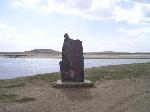
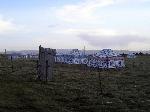
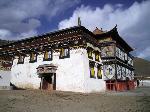
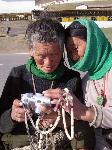
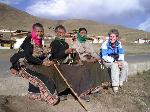
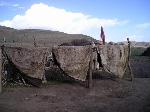
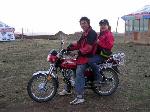
 Copyright © 1998-2026 All rights reserved.
Copyright © 1998-2026 All rights reserved.
1.
Oct 17, 2007 05:28 Reply
JOANNEL said:
Hi Jabarootoo, sounds dreamy. I have just come back from 3 weeks with a friend in Leshan. She left before i did with two other families to go on a trip up to Ruergai. Could it be her and her friends that you caught a lift with? It was over the holidays and her name is XuShan- they all come from Leshan.
Jo